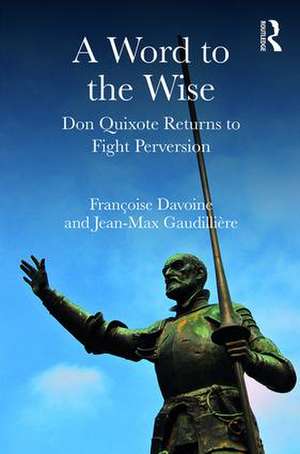A Word to the Wise: Don Quixote Returns to Fight Perversion
Autor Françoise Davoine, Jean-Max Gaudillièreen Limba Engleză Paperback – 17 mai 2018
The authors follow in his footsteps as he embarks on this other extraordinary journey in which perversion is laid bare for all to see, creating not only a powerful social link, but even a form of government. Cervantes shows us how madness acts as a means to confront it: here again, the field of action presented to the reader is explored in rigorous detail. The reliability of this strategy derives from the power of the given word, which has to oppose lies, seduction, secrets, trickery and crime, in order to confer authenticity to what madness reveals.
Preț: 336.57 lei
Preț vechi: 354.28 lei
-5% Nou
Puncte Express: 505
Preț estimativ în valută:
64.41€ • 66.54$ • 53.61£
64.41€ • 66.54$ • 53.61£
Carte tipărită la comandă
Livrare economică 25 martie-08 aprilie
Preluare comenzi: 021 569.72.76
Specificații
ISBN-13: 9781782206224
ISBN-10: 1782206221
Pagini: 270
Dimensiuni: 152 x 229 x 14 mm
Greutate: 0.41 kg
Ediția:1
Editura: Taylor & Francis
Colecția Routledge
Locul publicării:Oxford, United Kingdom
ISBN-10: 1782206221
Pagini: 270
Dimensiuni: 152 x 229 x 14 mm
Greutate: 0.41 kg
Ediția:1
Editura: Taylor & Francis
Colecția Routledge
Locul publicării:Oxford, United Kingdom
Public țintă
Professional Practice & DevelopmentCuprins
Acknowledg ements -- Abo ut the author s -- Chapter One -- The child rebels -- Chapter Two -- Bion—Quixote -- Chapter Three -- Accomplices -- Chapter Four -- Fuenteovejuna -- Chapter Five -- On the road again! -- Chapter Six -- Post-scriptum -- References -- Index
Notă biografică
Françoise Davoine obtained an Agregation in classics (French literature, Latin and Greek) in 1966, followed by a doctorate in sociology in 1981, before becoming a psychoanalyst. She worked for thirty years as a psychoanalyst in public psychiatric hospitals in France, as well as an external consultant, and is currently in private practice.
Jean-Max Gaudillière became a psychoanalyst and member of the Ecole Freudienne in Paris and worked as a psychoanalyst in public psychiatric hospitals, where he discovered the impact of the historical catastrophies reflected in the symptoms of patients confined to asylums.
Jean-Max Gaudillière became a psychoanalyst and member of the Ecole Freudienne in Paris and worked as a psychoanalyst in public psychiatric hospitals, where he discovered the impact of the historical catastrophies reflected in the symptoms of patients confined to asylums.
Recenzii
‘Don Quixote is the world’s best-selling novel, and like all masterpieces, it is inexhaustible. Freud was not the only one using literature to feed his theoretical thinking. Similarly, the authors of this book come up with new theories of the psyche, in this case of the widespread social ill of perversion, out of a creative encounter between literature and their clinical practice, as well as their life-long impassionate theoretical reflection. Thanks to a thorough knowledge of cultural history from the Middle Ages to the present, they demonstrate how cultural works have things to say that we can use on behalf of contemporary society.’-Mieke Bal, Professor, ASCA (Amsterdam School for Cultural Analysis), Royal Academy of Arts and Sciences
‘With their customary elegance, erudition and, even, attitude, Francoise Davoine and Jean-Max Gaudilliere re-introduce us to their supervisor, Don Quixote, through whom they, with Cervantes, illuminate - no, expose - the psycho-political illness of our own time: perversion, the totalitarianism that enforces it and the envy that drives it. A literary adventure, a clinical tour de force, and true.’- M. Gerard Fromm, Distinguished Faculty, Erikson Institute, Austen Riggs Center, USA; President, International Dialogue Initiative; Author, Lost in Transmission
‘With their customary elegance, erudition and, even, attitude, Francoise Davoine and Jean-Max Gaudilliere re-introduce us to their supervisor, Don Quixote, through whom they, with Cervantes, illuminate - no, expose - the psycho-political illness of our own time: perversion, the totalitarianism that enforces it and the envy that drives it. A literary adventure, a clinical tour de force, and true.’- M. Gerard Fromm, Distinguished Faculty, Erikson Institute, Austen Riggs Center, USA; President, International Dialogue Initiative; Author, Lost in Transmission
Descriere
After giving us a fascinating reading of Cervantes' classic novel in Don Quixote: Fighting Melancholia, Francoise Davoine and Jean-Max Gaudilliere co-author a second work, to reflect on the hero's battle against perversion. To do so, they retrace his adventures in the Cervantes' second Don Quixote, written ten years after the first.
